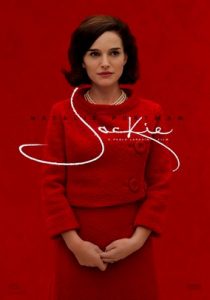Jackie-2016
Director Pablo Larrain
Starring Natalie Portman
Scott’s Review #576
Reviewed January 1, 2017
Grade: A-
Natalie Portman carries the 2016 biographical-drama film based on the life of Jackie Kennedy and the events directly following the assassination of John F. Kennedy in 1963.
The film does not retread conspiracy theories or feature more than a few brief glimpses of JFK himself. Instead, it tells Jackie’s story and what she faced throughout the ordeal.
The film wisely uses flashbacks to show the famous tour of the White House, which Jackie gave shortly before the President’s death.
It is a bravura performance by Portman as Jackie.
Director Pablo Larrain, primarily known for achievements with foreign-language films (the Chilean film No (2012), comes to mind), rather than the American history genre, is successful in his work with direction.
The film is gloomy, both in tone and with the terrific brooding musical score composed by Mica Levi, with its loud, abrupt sound effects.
The overall feel of the film is foreboding and dark.
The main activity is told through a famous Life interview that Jackie Kennedy gave a week after the assassination. The reporter was Theodore H. White, who was slightly less than sympathetic in demeanor toward the First Lady.
Held in Massachusetts, Jackie is still pained in peaceful tranquility away from the limelight.
Portman successfully reveals two sides of Jackie Kennedy to the audience. Not simply the smiling debutante she always portrayed publicly, Jackie was also a complex, feisty woman.
She vehemently wanted the world to see how brutal the assassination was, how proud she was of her husband, and how she would not back down from holding a lavish and public funeral procession for her deceased husband.
Jackie was met with harsh criticism and defiance for her desire. A proud woman, she did not wish to run away and hide from the terrible events.
Jackie is mostly a quiet, introspective film. Much of the film is about Jackie being interviewed, and there are flashbacks of her giving the White House tour.
Typically, Portman portrays Jackie as prim, proper, and demure. She is always filled with class and grace.
In one riveting sequence, though, we see Jackie walking through the White House, smoking cigarettes and drinking vodka. She appears alone and vulnerable, having just lost her husband.
Portman embraces her pain, and the audience grieves with her. She is alone in more ways than one. We see her not only as a First Lady but also as a sad woman in her agony.
Portman is fantastic in her mannerisms and tone of voice.
I loved the continuous usage of flashbacks to tell the story. Still, the film does not delve into an unneeded history lesson. We all know what happened. The point of the film is to answer curiosity about Jackie.
What is most effective is the focus on Jackie’s reactions and how Jackie handled the events.
In a grotesque scene rivaling any horror film, we are right there with Jackie in the car that fateful day as a shot rings out, blowing JFK’s head wide open. Sinking into Jackie’s lap, she later candidly describes to the Life magazine reporter how she attempted to hold the remains of his head together.
We then see her wandering around, her beautiful pink suit smeared with blood.
A quiet yet compelling and mesmerizing film, Portman is the main draw. She channels emotions of heartbreak, sadness, and composure.
Jackie was a fantastic First Lady who was always graceful and proper, but Portman shows another side of her that very few people knew about.
In addition to this fine acting, Jackie (2016) is a dark, brooding film that successfully tells this woman’s story.
Oscar Nominations: Best Actress-Natalie Portman, Best Original Score, Best Costume Design
Independent Spirit Award Nominations: Best Feature, Best Director-Pablo Larrain, Best Female Lead-Natalie Portman, Best Editing
